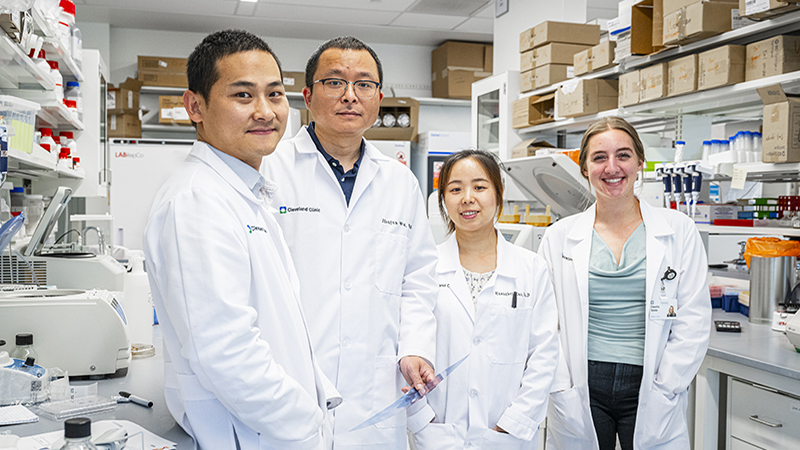
Dr. Wu, second from the left
Landing research funding is a balancing act between novelty and feasibility – one that Jianjun Wu, PhD, struck not once, but twice.
It all began in 2021 when Dr. Wu applied for a VeloSano Pilot Grant to fund his innovative research of a protein called STING. STING helps turn on the body’s immune system by inducing inflammation in response to threats. He was successful in his bid for VeloSano funding and began research with his team in 2022.
Fast-forward three years and backed by a team of experienced mentors who honed his grant writing and lab operation skills, Dr. Wu was able to take his findings from his initial VeloSano-funded research to apply for a five-year, $2.3 million National Institutes of Health MERIT Award.
“Through VeloSano grant support, we made a breakthrough discovery that STING activates T cell death,” says Dr. Wu. “With these preliminary data, we have been successfully awarded an NIH/NCI R37 MERIT award, which will continue to support us in this project.”
Most immunotherapies weaponize our adaptive immune systems, which involves cells like T cells and must be actively turned on to target specific threats. Innate immunity involves processes like inflammation or mucous production, patrolling our systems to detect and fight against general threats as they come. When Dr. Wu started investigating STING as a postdoctoral researcher studying herpesvirus, scientists had identified its role in antiviral signaling. As the field is moving forward, Dr. Wu is now a leading expert on STING’s role in connecting the innate immune system to adaptive immunity in inflammation and cancer. His discoveries have formed a basis for many drug discovery programs to improve immunotherapies.
STING plays a central role in helping our innate immune sense tumors and trigger robust antitumor adaptive immune responses. Activating STING in preclinical models has shown promising antitumor responses in the lab. However, clinical trials activating STING based on these studies have underperformed. Dr. Wu, who now runs a lab in the Center for Immunotherapy & Precision Immuno-Oncology, says more research is needed to understand why activating STING didn’t work in clinical trials and how to translate its activities into drug development. Dr. Wu’s lab has already made critical discoveries about STING’s activities. Even though STING activation triggers molecules called interferons to promote antitumor immunity, the Wu Lab found that STING activation also turns on self-destruction programs in tumor-fighting T-cells, leading to a net negative immune response.
Dr. Wu believes that STING-mediated T cell death represents an important cause of tumor resistance to STING therapy. With the support from the NCI MERIT award, Dr. Wu’s group aims to develop novel strategies to block STING-mediated T cell death and overcome tumor resistance to STING activation therapy.
“Our overall immune function is heavily reliant on innate immunity, but our understanding of the role of innate immunity in cancer immunotherapy lags behind,” he says. “I believe studying STING is a unique opportunity to investigate the interplay between innate immunity and cancer
immunotherapy, with the ultimate goal of harnessing innate immune responses to develop next-generation immunotherapies.”
Targeting innate immunity isn’t a common approach to immunotherapy, Dr. Wu says. When he was writing proposals to fund the next steps of his project, he turned to other immunity experts at the Cleveland Clinic for guidance. Dr. Wu first connected with Cleveland Clinic’s Office of Research Development to enroll in a grant writing course and an early career coaching program. Through the program, Dr. Wu was mentored by a multidisciplinary committee of established PIs from across the Institute, including:
“I am very impressed with the resources Cleveland Clinic has provided me as an early-career PI,” he says. “These programs have been instrumental in helping me navigate the more ‘business’ side of running a lab including mentoring and managing others, budgeting and communicating with different groups like the NIH. I am very grateful for their support”
Under his committee’s mentorship, Dr. Wu’s grant scored in the top 2% of all grants submitted in that cycle. The NIH/NCI themselves then nominated Dr. Wu’s proposal to be considered for a MERIT award.
“Dr. Wu’s work is very impressive science, and it is what ultimately earned him NIH recognition,” says Dr. Chan, who is Chair of Cleveland Clinic’s Global Immunotherapy Center. “Our job as Dr. Wu’s mentors was to show him the best approach to communicate how important his work is to grant review committees and other colleagues.”
